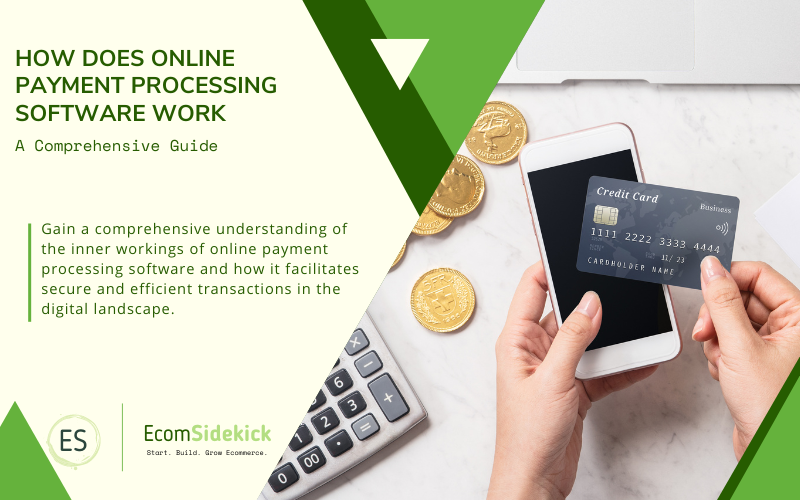Online payment processing software (OPPS) has become a vital part of eCommerce businesses around the globe, offering organizations a chance to increase their sales and profits by accepting online and mobile payments from customers. They also work well with digital wallet payments, a rising trend nowadays.

But how does Online Payment Processing software work? And why should you consider using it instead of other methods? We took a closer look at the details of OPPS and how it can benefit your business in no time.
What Is Online Payment Processing Software?
Online Payment Processing Software is an application that allows business owners to accept credit and debit cards as payment online. It’s also known as “online checkout” or “e-commerce checkout.” This type of software is used for both small and large-scale transactions. Some popular companies such as Stripe are ones that you have probably heard of. However, there are many other alternatives to Stripe out there as well.
The benefits of using OPPS are numerous:
Increased and Cheaper Online Sales
With the help of OPPS, merchants can easily sell products online without worrying about handling cash or checks. They can set up an account with a third-party financial institution such as PayPal and Stripe, which authorize users to make purchases on their behalf, and then collect all funds when they receive them. This will also leave your customers free to use whatever online payment method they want.
By using OPPS, you will not have to pay expensive transaction fees on credit cards to process payments. Instead, they only need to pay a monthly fee to the payment gateway. In addition, there are no additional charges for each transaction.
Easier and Safer
Unlike some other payment processor options, OPPS is simple to use. Merchants just need to create an account with a reputable provider, enter their bank information, select their preferred shipping method, and choose whether they want to offer discounts.

When someone purchases through OPPS, the merchant receives an order confirmation email immediately after confirming customer payment. The merchant can then send the goods directly to the buyer or ship them to a fulfillment center.
And because online transactions are more secure than traditional ones, merchants can rest assured knowing that their customers will have less risk of fraud, even if they use chip cards. They will also receive their product within the agreed-upon business days.
Efficient Enterprise Resource Planning
Enterprise Resource Planning refers to the integrated management of essential business resources such as human resources, project management, risk management, and other crucial aspects of a company. With OPPS, companies can manage these resources efficiently, allowing them to focus on growing their business.
When the system is set up correctly, your online payment system and mobile devices can collect and record all transaction data. This allows you to retain a record of all incoming payments the business receives, improving all elements of resource planning for your business.
But it’s not all about business days. Since OPPS doesn’t require merchants to handle physical items for in person payments, they won’t have to deal with waste disposal issues. Furthermore, since the system uses electronic data transfers, usually from digital wallets, merchants won’t have any paper records to store.
But How Does Online Payment Processing Software Work?
This part of our article will provide a brief overview of how being an online merchant is how electronic commerce works. We will also try to explain why having an online payment solution is so important to your business.
First, we have to understand something called the sales cycle. Most people think of it when considering electronic commerce. After all, isn’t that what we do every day? In reality, though, the sales cycle consists of four distinct stages:
- Lead Generation
This stage begins when a potential customer visits your website. They may click on one of your advertisements or links or type in a search term that brings them over.
Once they have arrived at your page, they may read some content, watch a video, or download something from your site.
If the customer decides to buy something, they will fill out a form asking for contact details. This is called lead generation because it generates leads (potential buyers) for your business.
- Qualification
Once you’ve generated a lead, you must qualify it before proceeding with the sale. Qualifying a lead involves determining which prospects are most likely to become customers.
For example, suppose you sell software products. In that case, look at the size of the company, its location, the industry it operates in, and the number of employees. You could also ask questions about the prospect’s needs, wants, and budget. Once you’ve qualified the lead, you’ll move into the next stage.
- Negotiation
At this point, you’re ready to negotiate. Negotiating means finding out what the buyer wants and offering it to them. If you’re selling software, you might offer a discount based on the company’s size. Or you might offer a free trial version.
- Close
After you’ve negotiated, you’ll need to close the deal. Closing the deal means delivering the product or service to the customer. It also includes collecting payment details, processing the order, and shipping the goods within the agreed business days.
How Does Online Payment Processing Software Impact The Sales

Online payment systems make the entire process easier than ever before, especially for customers used to relying on digital wallet payments and mobile devices. Here are just a few ways that online payment systems improve the sales cycle:
- Lead Generation
You can generate more leads than ever by using online payment processing solutions such as this. You won’t need to rely on traditional advertising methods like print ads, television commercials, radio spots, billboards, etc.
You can now use websites, email marketing campaigns, social media sites, mobile device apps, and other forms of digital communication to reach new customers.
- Qualification
With an online payment system, it’s easy to determine whether a lead is worth pursuing. Instead of sending dozens of emails to different companies, you can easily send one message to multiple recipients.
And instead of calling each person individually, you can simply call a toll-free number and speak directly to someone who answers the phone.
- Negotiation
When you can access real-time data, you can quickly see how much money you’re losing by not negotiating. By using an online payment processor, your sales team can better understand what their competitors are charging and adjust their transaction costs accordingly.
- Close
An online payment system allows you to automate many aspects of closing a sale. With a virtual terminal, there’s no longer any reason to manually enter credit card details. Instead, you can create automated processes that collect payments automatically from cards like American Express or gift cards. Your customers can also take advantage of digital wallet payments.
- Post Sale Support
An online payment system allows you to accept international payments quickly and easily. Faster processing enables you to provide post-sale support.
When you receive a purchase order, you can immediately start working on fulfilling it. In addition, you can track shipments, invoices, and other essential details. This makes it possible for you to provide excellent after-sale services. Popular companies like Square can offer a POS component as well as a payment processing component.
How to Choose an Online Payment Processing Software

Choosing the right online payment processing service is critical to the success of your business. There are several factors to consider when selecting one of many processing solutions. Let’s take a look at the main ones:
- Security
First, you should ensure that the online payment processing option you select offers strong security features. A good virtual terminal will encrypt sensitive data such as credit cards and limit access to authorized users only.
- Scalability
You want to be able to scale up if necessary. You don’t want to invest in a third-party payment processor that won’t allow you to grow with your company. This could include accepting different payment options like debit card payments; or allowing for remote card payments. You always want a back up processing option incase your merchant account goes down. In some cases they can hold onto your money until the issue is resolved.
- Features
What kind of functionality does the software offer? What kinds of alternative payment methods can it handle? How flexible is the software? Is it compatible with all major browsers? Does it have a good design with a clear payment button? What does the payment gateway integration look like?
- Cost
Cost is always a concern. Remember that your fee structure will reflect on your customers and their preferred payment methods. But you also need to take into account the cost of ownership. Will the credit card payment processing software require maintenance fees? Are there hidden costs? Do the payment processing fees look the same for different payment types?
- Integration
Integration is key. If you plan to integrate with third-party applications like mobile wallets, you’ll want to know which ones they support. Also, you’ll want to find out if they support integration with your chosen online forms of payment processing software. Also, ALWAYS have a back up merchant account in case your account ever goes down or gets banned. In industries with high ticket items and also fringe type products, this is a MUST.
Final Thoughts
Online payment systems make it easier than ever to process transactions. They help you increase revenue while reducing overhead expenses and give you the flexibility to adapt to changing market conditions. However, before making a final decision, you must weigh the pros and cons of various solutions.
Frequently Asked Questions
What Is Online Payment Processing Software, and How Does It Work?
Online payment processing software facilitates the secure and seamless transfer of funds from customers to businesses over the internet. It typically involves several steps, including authentication, authorization, and settlement, to ensure successful and safe transactions.
How Does the Payment Process Begin for Online Transactions?
The payment process starts when a customer makes a purchase on a website or app. They select their desired items, proceed to checkout, and enter their payment information, such as credit/debit card details or use other online payment methods.
What Happens After the Customer Submits Their Payment Information?
Once the customer submits their payment information, the online payment processing software securely transfers the data to the payment gateway for verification and processing.
Paul Martinez is the founder of EcomSidekick.com. He is an expert in the areas of finance, real estate, eCommerce, traffic and conversion.
Join him on EcomSidekick.com to learn how to improve your financial life and excel in these areas. Before starting this media site, Paul built from scratch and managed two multi-million dollar companies. One in the real estate sector and one in the eCommerce sector.

